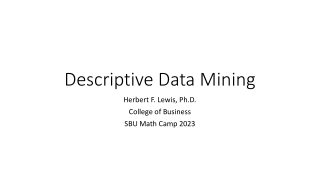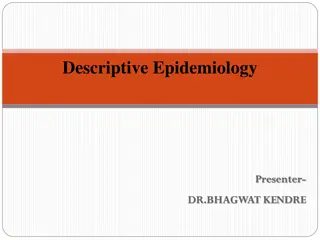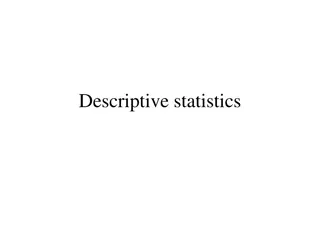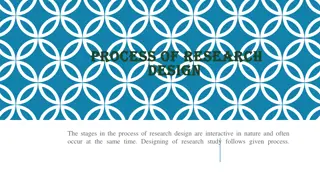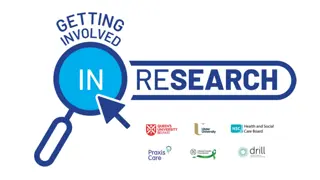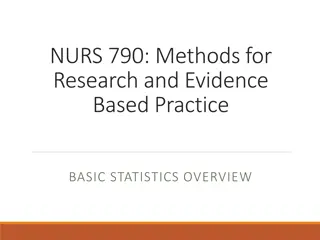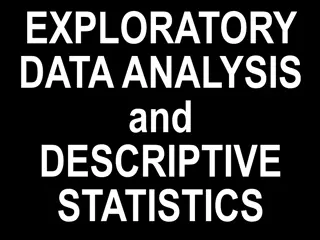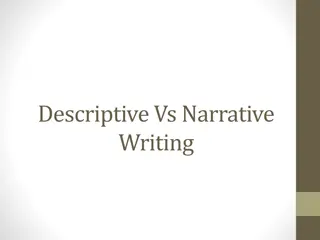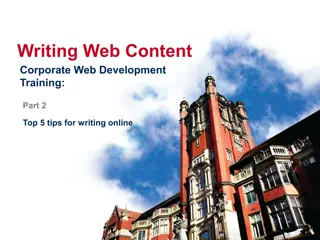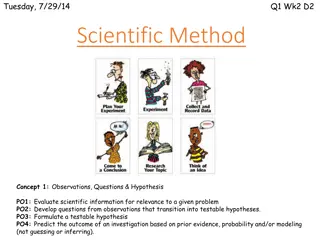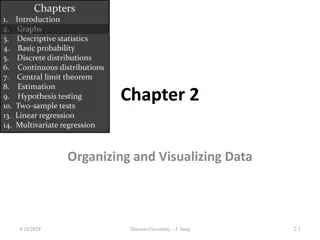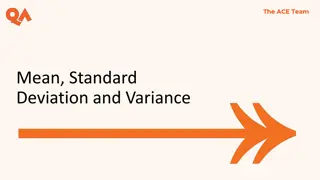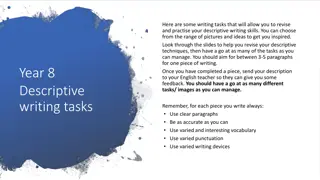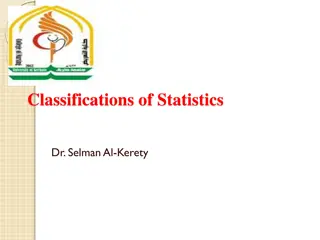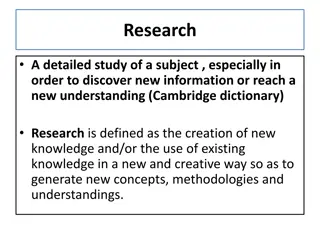Chapter 01 Descriptive Statistics
This chapter provides an introduction to descriptive statistics, covering basic concepts, sampling schemes, graphical representation of data, and numerical description of data. It also explores the role of computers in statistics. The chapter includes computer examples and projects for further pract
5 views • 58 slides
Descriptive Data Mining
Descriptive data mining analyzes historical data to find patterns, relationships, and anomalies, aiding in decision-making. Unsupervised learning and examples of techniques like clustering are explored, showcasing the power of data analysis in business.
1 views • 49 slides
Understanding Descriptive Epidemiology for Health Analysis
Descriptive Epidemiology, presented by Dr. Bhagwat Kendre, explores the distribution of diseases and related characteristics within populations. The study delves into factors like time, place, and person to identify patterns and formulate hypotheses about disease occurrence. Utilizing data from desc
3 views • 36 slides
Understanding the Process and Types of Research Design
The process of research design involves interactive stages that occur simultaneously, leading to the designing of a research study. This includes steps in research design, classification of research design types, such as exploratory, descriptive, and experimental/causal research design. Each type se
12 views • 8 slides
Understanding Descriptive Statistics in Research
Descriptive statistics are essential in summarizing and analyzing large datasets to uncover trends and tendencies within the data. They include measures of central tendency, dispersion, and skewness, aiding in better understanding and communicating research results. Frequency distributions provide i
0 views • 32 slides
Contrasting Concepts in Political Science: Normative vs Descriptive Approaches
Normative and descriptive concepts in Political Science explore contrasting viewpoints on how things should be versus how they actually are. While normative claims focus on value judgments, descriptive claims deal with facts. These concepts complement each other by providing both theoretical and pra
0 views • 10 slides
Understanding Different Types of Specifications in Estimation and Costing
In the field of estimation and costing, four main methods of specifying are used: Descriptive, Performance, Reference Standard, and Proprietary. Descriptive specifications provide detailed descriptions without using proprietary names, allowing for tight control over specified work. Performance speci
1 views • 9 slides
Enhancing Descriptive Writing with Similes and Metaphors
Using similes and metaphors can greatly enhance descriptive writing by creating vivid imagery and engaging comparisons. This interactive content explores the definition of similes and metaphors, provides examples, and encourages practice through exercises related to the sun, rain, wind, and more. It
0 views • 6 slides
Exploring Descriptive Detail Through Expanded Noun Phrases
Delve into the art of using expanded noun phrases for descriptive richness in writing, as showcased through authentic texts and engaging discussions. Uncover how these linguistic choices bring life to descriptions, enhance imagery, and spark creativity in readers' minds.
0 views • 6 slides
Immersive Rainforest Adventure for Year 3 Students
Embark on a virtual journey to explore the Amazon Rainforest through descriptive writing, observation tasks, and punctuation exercises. Dive into the lush setting as if you were a resident animal, enhancing your language skills with vivid imagery and engaging activities. Experience the beauty and my
0 views • 13 slides
Mastering Powerful Verbs for Descriptive Writing
Learn how to enhance your writing by incorporating powerful verbs. Practice identifying verbs, adverbs, and nouns, and unleash your creativity by crafting sentences using dynamic action words. Explore the vivid descriptions of natural disasters like volcanic eruptions through engaging activities and
0 views • 7 slides
Understanding the Process and Types of Research Design
The process of research design involves interactive stages occurring simultaneously, leading to the creation of a structured study. There are three main types of research design: exploratory, descriptive, and experimental (or causal). Each type has its own objectives and methods. Exploratory researc
0 views • 7 slides
Understanding Descriptive Statistics in AP Biology
Descriptive statistics play a crucial role in analyzing and interpreting data in AP Biology. They include mean, sample size, standard deviation, and standard error, helping researchers arrive at conclusions, support arguments, and communicate findings effectively. Knowing how to calculate and interp
0 views • 30 slides
Understanding Research Methods: Quantitative, Qualitative, and Mixed Approaches
This introduction provides an overview of qualitative, quantitative, and mixed methods research, highlighting key differences and various types of research approaches. It delves into exploratory, descriptive, and causal research methodologies, offering insights into problem discovery, data collectio
0 views • 50 slides
Understanding Basic Statistics in Research and Evidence-Based Practice
Basic statistics play a crucial role in research and evidence-based practice. Descriptive statistics help summarize data, while inferential statistics make inferences about populations based on samples. Various types of statistics like hypothesis testing, correlation, confidence intervals, and signi
3 views • 15 slides
Exploratory Data Analysis and Descriptive Statistics in Statistical Analysis
Exploratory Data Analysis involves understanding data characteristics through visualization techniques like bar graphs, pie charts for qualitative data and histograms, scatterplots for quantitative data. It includes calculating mean, median for center, range, standard deviation for spread, and ident
0 views • 7 slides
Understanding Descriptive vs. Narrative Writing Styles
Delve into the nuances of descriptive and narrative writing, exploring the differences between these two styles. Learn how each style conveys information, from sensory details in descriptive writing to storytelling in narratives. Discover similarities between the two styles and how to structure essa
2 views • 9 slides
Understanding Adjectives and Adverbs for Descriptive Writing
Learn how adjectives and adverbs enhance writing by adding specific details about people, objects, and actions. Adjectives modify nouns to make sentences more descriptive, while adverbs provide additional information about verbs or adjectives. Discover the importance of using these descriptive words
0 views • 26 slides
Effective Tips for Writing Online Content
When writing for the web, it's crucial to be direct, concise, and engaging. Use clear headings and page titles, make your content scannable, adopt a conversational tone, and avoid passive voice. Frontload headings with important keywords and keep them short and descriptive. Choose descriptive page t
0 views • 39 slides
Mastering Descriptive Writing Techniques
Enhance your descriptive writing skills by learning how to use detailed descriptions, engage the senses, ask crucial questions, incorporate powerful vocabulary, and avoid non-specific words. These techniques will help you create vivid and engaging narratives that captivate your readers.
0 views • 13 slides
Mastering Descriptive Writing: Creating Vivid Images with Words
Utilizing descriptive paragraphs helps writers paint a vivid picture for readers by engaging all senses through specific language and adjectives. This guide explores the components of a descriptive paragraph, from the topic sentence to supporting details and a concluding statement. Learn how to use
0 views • 17 slides
Exploration of Various Poetry Forms: Descriptive, Narrative, Dramatic, and Metaphysical
Poetry is a diverse art form encompassing descriptive portrayal, storytelling narratives, engaging dialogues, and profound metaphysical insights. Descriptive poetry vividly captures objects and scenes like paintings, narrative poetry weaves interconnected stories, dramatic poetry involves dialogues,
0 views • 11 slides
Understanding the Scientific Method: Observations, Questions, and Hypotheses
Explore the scientific method concept of making observations, asking questions, and forming hypotheses. Learn the difference between causal and descriptive questions and practice applying them. Understand how to approach a situation like a non-starting washing machine through causal and descriptive
0 views • 28 slides
Understanding Descriptive Statistics: A Comprehensive Overview
Descriptive statistics involve organizing and presenting data to extract valuable insights. This overview covers key concepts like populations, samples, variable definitions, types of data, and methods for summarizing information. It also touches on organizing and visualizing data using graphical te
0 views • 48 slides
Descriptive Writing Challenge: Character Description and Productive Questions
Engage your students in a creative writing challenge focused on character description. Encourage them to craft detailed segments and utilize productive questions to enhance their storytelling skills. The challenge promotes critical thinking and descriptive writing techniques through interactive task
0 views • 7 slides
Understanding Descriptive Statistics: Mean, Standard Deviation, and Variance
Explore the fundamentals of descriptive statistics focusing on mean, standard deviation, and variance. Dive into the importance of these measures in interpreting data patterns effectively, with practical examples like analyzing the average height of individuals and understanding central tendency met
1 views • 23 slides
Mastering Commas in Grammar: Activities and Practice
Embrace the art of using commas correctly by engaging in various activities and watching informative videos. From understanding the dangers of incorrect comma usage to practicing with quizzes and worksheets, this session focuses on honing your skills. Dive into the world of commas through engaging t
0 views • 31 slides
Enhancing Descriptive Writing Skills Through Engaging Tasks
Explore a variety of writing tasks designed to enhance descriptive writing skills, including using nouns, adjectives, verbs, and adverbs creatively. Learn about descriptive techniques such as metaphors, similes, and imagery to enrich your writing. Practice choosing precise vocabulary to create diffe
0 views • 8 slides
Exploring the Art of Descriptive Writing
Descriptive writing aims to immerse readers in a sensory experience by vividly portraying people, places, or things through carefully chosen details. Description paragraphs should focus on action over sensations, providing essential information in a clear, detailed, and chronological manner. The ele
0 views • 5 slides
Exploring the Dimensions of Slurs: Expressive vs. Descriptive Aspects
Investigating the dual nature of slurs, this study delves into the expressive and descriptive dimensions of derogatory terms. Through experimental evidence and linguistic analysis, it explores how slurs convey both speaker-centered emotions and objective information about targeted groups. The resear
0 views • 45 slides
Learning Descriptive Adjectives: Forms, Agreement, and Position
This lesson covers the forms, agreement, and position of descriptive adjectives, including regular and irregular adjectives. You will learn about the pronunciation of adjectives and their usage with examples. Understanding the agreement of adjectives with nouns in gender and number is essential. Pra
0 views • 6 slides
Mastering Descriptive Writing: Techniques and Practice
Delve into the art of descriptive writing by exploring noun phrases, verbs, pre-modified nouns, and exciting vocabulary. Practice writing descriptively with engaging exercises, including creating vivid descriptions of chocolates and lonely characters. Enhance your skills in crafting expressive and c
0 views • 8 slides
Understanding Descriptive Epidemiology in Public Health
Descriptive epidemiology involves the study of disease occurrence and distribution in populations. It focuses on describing patterns of disease occurrence based on who gets sick, where rates are highest and lowest, and temporal patterns of disease. Descriptive studies are essential for public health
0 views • 18 slides
Statistical Analysis: Descriptive and Inferential Techniques Overview
Understanding statistical analysis involves both descriptive and inferential techniques. Descriptive statistics focus on summarizing data, including measures of central tendency and dispersion. In contrast, inferential statistics use sample data to make inferences about populations and test hypothes
0 views • 19 slides
Descriptive Analysis of Statutory Notifications from Residential Care Facilities in Ireland
This study conducted by Stephanie O'Regan, a Research Assistant at HIQA, presents a descriptive analysis of statutory notifications from residential care facilities for older persons and people with disabilities in Ireland. The research explores the types of adverse events reported, trends in notifi
0 views • 30 slides
Evolution of Linguistics: From Philosophy to Descriptive Study
Linguistics has evolved significantly from being a branch of philosophy to a distinct field called Descriptive Linguistics. It now focuses on studying language in itself rather than in relation to other disciplines, aiming to describe and analyze the structure and operation of languages at different
0 views • 20 slides
Different Classifications and Guidelines for Descriptive Statistics
This content discusses the two broad classifications of statistics - descriptive and inferential. It delves into descriptive statistics, which help organize and summarize numerical data, and explores various ways to categorize them. It covers measures to condense data, central tendency, variability,
0 views • 26 slides
Understanding the Purpose of Research: Exploratory, Descriptive, and Explanatory Studies
Research is a systematic inquiry process that involves data collection, critical information documentation, analysis, and interpretation. It serves three main purposes: exploratory research to explore questions, descriptive research to expand knowledge on current issues, and explanatory research to
0 views • 14 slides
Chicken Foot Writing: A Scaffolding Strategy for Descriptive Assignments
Chicken Foot Writing is a helpful tool for organizing and structuring descriptive writing tasks, guiding students through transforming rough notes into well-constructed paragraphs. This strategy, developed by Keith Brown, aids in independent thinking and efficient completion of literary assignments
0 views • 8 slides
Study on Pricing and Place Strategy of Himalayan Java Coffee: A Detailed Analysis
This report delves into the pricing and place strategies of Himalayan Java coffee, focusing on factors influencing coffee pricing and selection of outlet locations. The study aims to identify the target market, understand competitive dynamics, and analyze factors impacting coffee sales at Himalayan
0 views • 10 slides

